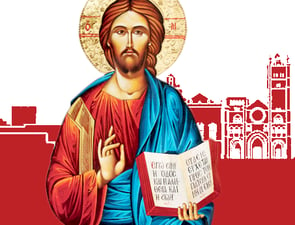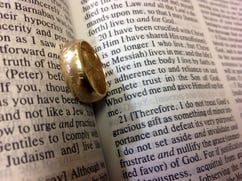 Our vocation is to transform the world. Transformation in Christ begins with us and effects change in the world.
Our vocation is to transform the world. Transformation in Christ begins with us and effects change in the world.
Over the years I have read many books on evangelization. This has been my interest since Paul VI’s On Evangelization in the Modern World was published in 1975. A decade later, as a Pauline sister, I felt called to invite the laity to live the Pauline charism and mission with us. I began to study the Second Vatican Council documents in earnest and found that the theology of Church begins in Baptism, the sacrament which brings us equally into the priestly community and calls all of us to proclaim the Gospel.
Dominican Timothy Radcliffe, in his book Take the Plunge, said that Christianity will thrive as we rediscover the beauty of Baptism because it touches the deepest dramas of human life. Theologian Michelina Tenace agrees that rediscovering a baptismal perspective will renew Christian identity, transform ecclesial communion, and clarify the meaning of our life and freedom. The Gospel of the life, death and resurrection of the Lord is the origin and goal of all sacraments, especially Baptism. Underscoring this places evangelization is its proper context as the vocational response of all the baptized.
Both Baptism and Eucharist incorporate us into Christ. Baptism celebrates the faithfulness of God and initiation into the Eucharistic community where we recapture our initial dying and rising with Christ and let it flow into and through our lives. We are plunged into Christ in Baptism to emerge as Gospel and, as John Paul II reminds us, our encounter with Jesus and the community is expressed and celebrated in the liturgy of the Eucharist, the ongoing culmination of initiation, the source and summit of all evangelization.[1]
For my 25th anniversary of profession of vows (2003) my mother gave me her wedding ring. I had it engraved with words from the Maronite Liturgy in Aramaic/Syriac: “This is my body given up for you.” Since these words in the Anaphora (consecration) are the most solemn part of the Divine Liturgy, I asked the Bishop if this would be permissible for me to do this as a sign of holy exchange. The Catholic Eastern Church’s Maronite Rite, one of the oldest in the Catholic Church tracing its roots to Antioch where “the disciples were first called Christian” (Acts 11:26),uses the Syriac name for the Divine Liturgy, Qurbono, meaning “offering or making holy.” This reminds Christians that the sacrificial act of Christ’s offering includes our own willingness to give our lives as an oblation. During Liturgy, the gifts, and by analogy the participants, are divinized by the action of the Holy Spirit. The epiclesis (Ancient Greek for “calling down from on high”) is that part of the Eucharistic Prayer by which the priest invokes the Holy Spirit. The same Spirit called to sanctify the waters of the baptismal fount which become the efficacious sacramental sign of new birth.
The Preparation of the Gifts is an act of offering by the whole community. The bread and wine selected from among the gifts we present are chosen to become the Body and Blood of Christ. Similarly, our gifts and dedication to be of service to Christ are consecrated through the action of the Liturgy. St. Augustine said that “This sacrifice is the symbol of what we are.” The whole event of the Incarnation, cross and resurrection present the way God draws us into union with him and how we grow into Gospel.
As a young professed sister I had many opportunities to enjoy Liturgies where large numbers of priests were present. For want of room on the altar they would stay in the pews during the celebration. At the consecration they would stand and pray the words of Consecration in close proximity to all of the faithful. During those moments I reflected on the offering we were all making, “This is my body, this is my blood,” they prayed in persona christi, in the person of Christ, while their hands were stretched toward the altar and over all of us in the pews. What a wonderful visual of what was occurring in reality—we were all praying to be made the true body of Christ. I found myself silently responding, “This is my body for you.” God, as the Fathers of the Church say, works this sacred exchange; he took on what was ours, so that we might receive what was his and become similar to God. Christianity accentuates ongoing conversion because it takes a lifetime to learn to live according to Baptism, dying with Christ in order to rise with Christ (Rm. 4:6).
Liturgy includes our whole life. “The true liturgical action is the deed of God, and for that very reason the liturgy of faith always reaches beyond the cultic act into everyday life, which must itself become ‘liturgical’ a service for the transformation of the world,” said Pope Emeritus Benedict XVI. Augustine exhorts us, “Because you are the body of Christ and his members, it is your own mystery that lies on the altar, it is your own mystery that you receive—Be what you see, and receive what you are.”
 St. Paul the great evangelizer was able to write, "It is no longer I who live, but Christ lives in me."
St. Paul the great evangelizer was able to write, "It is no longer I who live, but Christ lives in me."
This has implications for evangelization. Our vocation is to transform the world. Transformation in Christ begins with us and effects change in the world. Evangelization is a call to live Liturgy which attracts others when it looks not at itself, but at God, allowing God to enter our world and act. It authentically interprets the world anew in the light of God opening us up to God’s possibilities—for “nothing is impossible with God” (Lk. 1:37; Mt. 19:26). Those who are baptized are set within a new context to introduce into the world a seed of the culture of the resurrection and the beatitude of communion.[2] That is why Pope Francis said in order to evangelize all a person needs is Baptism.[3] The absolute newness of Jesus Christ in history continues in the absolute newness of the baptized person in society, nourished on Word and Eucharist in a mutual exchange of gifts, a dialogue of human offering and divine response. The fruit of this exchange is transformation in Christ, a living evangelization. We become Gospel, holy and transformed into Christ (Gal. 2:20; Gal. 3:27).
[1] John Paul II, On the Eucharist in its Relationship to the Church Ecclesia de Eucharistia,. Boston: Pauline Books and Media, 2003. §22. [2] Lumen Fidei, §41. [3] Vatican News Service “Pope Francis: To Evangelize, Baptism is Enough.”
Copyright 2014 Sr. Margaret Kerry, fsp
About the Author

Sr. Margaret Kerry, fsp
A Daughter of St. Paul for 40 years Sr. Margaret continues to pursue new ways to proclaim the Gospel: sharing the Pauline Charism with the laity, writing books (St. Anthony of Padua: Fire & Light; Strength in Darkness: John of the Cross; Prayers for the New Evangelization), & through direct evangelization. She is available for workshops on the Vocation & Mission of the Laity, Media Literacy, and The New Evangelization. mkerry@paulinemedia.com



.png?width=1806&height=731&name=CatholicMom_hcfm_logo1_pos_871c_2728c%20(002).png)
Comments